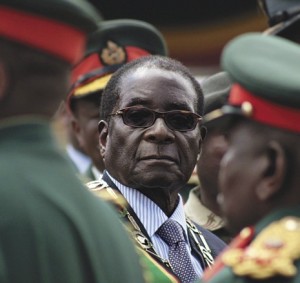By Jacob Kushner October 1, 2015

Robert Mugabe. ©Robin
In recent decades, Western media has tended to place the blame for Africa’s problems overwhelmingly on African shoulders. Given portrayals in the mainstream press, for example, one could have been forgiven for thinking that Robert Mugabe’s ongoing state plunder in Zimbabwe or the Joseph Kabila administration’s secret mining deals in Congo were purely African scandals, manufactured by Africans without any outside help.
And yet a subtle shift in western media’s coverage of Africa is underway: today many news outlets are making great efforts to uncover the ways in which foreign corporations and actors from North America, Europe and Asia are central to corruption on the continent. It is part of a larger effort by media outlets to improve their coverage of business and government corruption in Africa. Bloomberg, for example, recently announced a three-year $10 million pan-African program to boost its business coverage and improve government accountability.
One major new area of coverage to watch: “transfer pricing” deals between African leaders and large foreign corporations. In transfer pricing, governments sell their assets—minerals, oil, timber—at extremely undervalued prices to foreign investors through offshore companies. The foreign investors then resell the assets for up to five times as much and, often, share the profits with government leaders in private off-the-book exchanges. The spoils then go into the pockets of the foreign investors and African leaders, rather than into government coffers.
Last year, Reuters reported that a company linked to Israeli oil and minerals tycoon Dan Gertler sold some of its Congolese oil assets at an incredible 300 times the price it bought them for in a classic example of transfer pricing. In 2012, Michael Kavanagh and his colleagues at Bloomberg meticulously interviewed government officials, whistleblowers and other inside sources to produce an artful and digestible profile of Gertler and his shadow involvement in major transfer-pricing scandals in Congo.
![Africa, regions of the African Union. © Ali A. Fazal [CC BY-SA 3.0 (http://creativecommons.org/licenses/by-sa/3.0)], via Wikimedia Commons](https://coveringbusiness.com/files/wp-content/uploads/2015/10/africa-300x300.png)
Africa, regions of the African Union. © Ali A. Fazal [CC BY-SA 3.0 (http://creativecommons.org/licenses/by-sa/3.0)], via Wikimedia Commons
Transfer pricing—the selling of the assets at below market prices—is not always illegal. But it is when government officials receive kickbacks. And the temptation is high. While making foreign entities rich from the natural resources of impoverished nations, transfer pricing also “encourage(s) corruption, by allowing corrupt public officials to siphon money away from public coffers and into secret offshore bank accounts,” in the words of a May 2013 report by the non-profit Washington think-tank Global Financial Integrity (GFI). Researchers estimated these outflows cost Sub-Saharan Africa $1.2 to $1.4 trillion dollars since 1980—equivalent to 5.7 percent of the continent’s GDP.
Journalists interested in following the path forged by Kavanagh, Burgis and local African journalists such as members of the African Network of Centers for Investigative Reporting ANCIR, have more tools to do so than ever before. Below, we offer some resources to help you get started.
GLOBAL RESEARCH REPORTS:
PRIMARY SOURCE DOCUMENTS:
OFFSHORE DATABASE:
Journalists who are able to identify specific companies and government officials that seem to be involved in shady dealings, may be able to follow the money into the nebulous world of offshore banking for what may be the first time. That’s thanks to the International Consortium of Investigative Journalists’ treasure trove of leaked data from tax havens as small as the British Virgin Islands and as large as New Jersey. The Offshore Leaks Database is public, free and accessible at the ICIJ’s website.
LEGWORK:
Of course, it’s hard to beat old-fashioned reporting on the ground. A few years ago in Congo I phoned a former government official to ask about a Chinese mining deal I was investigating for my eBook, China’s Congo Plan. I had barely introduced myself when the official cut me off: “Is this about COMIDE?” I didn’t know what COMIDE was, but I soon learned it to be a secret lowball sale by Congolese officials of Congo’s stake in a mining venture called Comide SPRL that was likely worth millions of dollars—a prime example of transfer pricing. By poking around Congo’s notoriously secretive mining industry, calling people in person, I came across a scandal I hadn’t even heard about.
Burgis, Kavannagh and other business journalists based in Africa have demonstrated that in an age of internet archives, whistleblowers, public disclosures and affordable travel, to expose the foreign and multinational corporations that trick Africans out of their resources is imminently doable.
****
Jacob Kushner is a freelance journalist currently reporting on foreign aid, human rights, extractives in developing nations, and Chinese and other foreign investment in Africa. The latter two were the subjects of his recent eBook, China’s Congo Plan, available for you computer or mobile device from Amazon ($1.99) and Apple ($2.99, with full multimedia).
This entry was posted on Thursday, October 1st, 2015 at 3:05 pm. It is filed under On the Beat and tagged with Bloomberg, Offshore Leaks Database, Robert Mugabe, The Looting Machine, Tom Burgis, transfer pricing. You can follow any responses to this entry through the RSS 2.0 feed.
Comments are closed.
